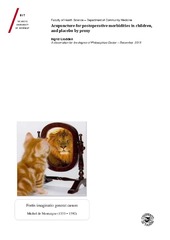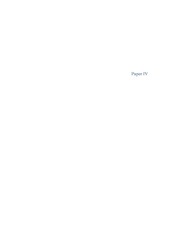| dc.contributor.advisor | Norheim, Arne Johan | |
| dc.contributor.author | Liodden, Ingrid | |
| dc.date.accessioned | 2016-07-11T11:21:17Z | |
| dc.date.available | 2016-07-11T11:21:17Z | |
| dc.date.issued | 2016-04-29 | |
| dc.description.abstract | Acupuncture may be beneficial for the prevention of postoperative nausea and vomiting in children and is associated with minor adverse events. The two RCTs in this dissertation investigated the effects of acupuncture by means of a pragmatic randomised controlled trial design. Placebo effects are affected by patient expectancy towards the treatment. The present survey explored the placebo effects by proxy which is a rather unexplored field. A narrative review summarised research on acupuncture and acupressure in ambulatory anaesthesia.
Conclusions
• When investigating the system effect, acupuncture during anaesthesia followed by postoperative acupressure seems to reduce vomiting in children after tonsillectomy and/or adenoidectomy.
• When investigating the specific effect with the intention to exclude placebo effects, acupuncture during anaesthesia does not seem to reduce nausea and vomiting in children after tonsillectomy and/or adenoidectomy.
• The survey on preoperative parental expectancy to treatment efficacy was not able to detect any such placebo effect by proxy.
• There may have been a placebo effect that was not captured by our measure of parental preoperative expectancy, and the explanations for the manifest discrepancy between the RCTs should be sought understood by the following factors:
o Placebo effects not accounted for by preoperative parental expectancy: Placebo effects emerging into and throughout the postoperative period on/by parents and children.
o Placebo effects conveyed by care-givers and assessor in the postoperative period.
o Nocebo effects in the Paper I study conveyed by all involved persons (children, parents, care-giver, and assessor), knowing that the children were allocated to control group.
o A specific effect of acupressure in the postoperative period, as opposed to only acupuncture during anaesthesia.
• The review showed that it is reasonable to consider acupuncture as part of ambulatory anaesthesia. However, since conclusive evidence regarding acupuncture effect is lacking, there have to be a trade-off between these treatments and other strategies in the future.
• Studies investigating acupuncture treatment for children should manage a balance between an adequate acupuncture dose and technique, and a child-friendly approach.
• Interesting issues for the future may be research on different acupuncture techniques and characteristics – in addition to the essential question about specific effects versus placebo effects.
| en_US |
| dc.description.doctoraltype | ph.d. | en_US |
| dc.description.popularabstract | Postoperativ kvalme og oppkast er ikke bare svært ubehagelig og stressende for pasientene, det kan også føre til mer alvorlige konsekvenser og øke ressursbruk samt forlenge sykehusoppholdet. Flere kvalmestillende medikamenter er i bruk, men de er bare delvis effektive. Det er derfor interessant å se på ikke-medikamentelle behandlingsformer som for eksempel akupunktur, som er en rimelig behandlingsform med minimale bivirkninger.
I sin doktoravhandling har Ingrid Liodden undersøkt i to randomiserte kontrollerte studier om akupunktur kan redusere oppkast etter tonsillektomi (kirurgisk fjerning av halsmandler) hos barn. Studiene omfattet til sammen 346 barn. Den ene studien viste effekt av akupunktur, den andre ikke. Det ble ikke vist noen sammenheng med foreldrenes preoperative forventninger og barnas opplevelse av oppkast. Ved å sammenligne utfallet i de to studiene, er det er imidlertid rimelig å anta at foreldrenes forventinger, kanskje endret over tid inn i den postoperative perioden, bidro til reduksjonen av oppkast, en såkalt placeboeffekt.
Akupunktur er en kompleks behandlingsform med mange komponenter, og det er derfor et krevende forskningsområde. I likhet med annen akupunkturforskning, er resultatene i dette forskningsprosjektet ikke entydige, men akupunktur for reduksjon av postoperativ kvalme og oppkast blir nå ansett som en kunnskapsbasert behandlingsform. Metodene er enkle og medfører lite eller ingen smerte og er godt egnet for både for voksne og barn. | en_US |
| dc.description | Papers I, II and III of this thesis are not available in Munin.<br>Paper I. Ingrid Liodden et al. Perioperative acupuncture and postoperative acupressure can prevent postoperative vomiting following paediatric tonsillectomy or adenoidectomy: a pragmatic, randomised, controlled trial. Available in <a href=http://dx.doi.org/10.1136/aim.2010.002915>Acupuncture in Medicine 2011;29:9–15</a><br>Paper II. Ingrid Liodden et al. Acupuncture versus usual care for postoperative nausea and vomiting in children after tonsillectomy/adenoidectomy: a pragmatic, multicentre, double-blinded, randomised trial. Available in <a href=http://dx.doi.org/10.1136/acupmed-2014-010738>Acupuncture in Medicine 2015;33:196–203</a><br>Paper III. Ingrid Liodden et al. The influence of parental anxiety to surgery and expectancy to acupuncture on postoperative morbidities in children. Available, with altered title, in <a href=http://dx.doi.org/10.1159/000442565>Forschende Komplementärmedizin 2015;22:381–387</a> | en_US |
| dc.identifier.uri | https://hdl.handle.net/10037/9423 | |
| dc.identifier.urn | URN:NBN:no-uit_munin_8975 | |
| dc.language.iso | eng | en_US |
| dc.publisher | UiT The Arctic University of Norway | en_US |
| dc.publisher | UiT Norges arktiske universitet | en_US |
| dc.rights.accessRights | openAccess | |
| dc.rights.holder | Copyright 2016 The Author(s) | |
| dc.rights.uri | https://creativecommons.org/licenses/by-nc-sa/3.0 | en_US |
| dc.rights | Attribution-NonCommercial-ShareAlike 3.0 Unported (CC BY-NC-SA 3.0) | en_US |
| dc.subject | acupuncture | en_US |
| dc.subject | postoperative nausea and vomiting | en_US |
| dc.subject | children | en_US |
| dc.subject | placebo by proxy | en_US |
| dc.subject | VDP::Medisinske Fag: 700 | en_US |
| dc.subject | VDP::Medical disciplines: 700 | en_US |
| dc.title | Acupuncture for postoperative morbidities in children, and placebo by proxy | en_US |
| dc.type | Doctoral thesis | en_US |
| dc.type | Doktorgradsavhandling | en_US |


 English
English norsk
norsk

